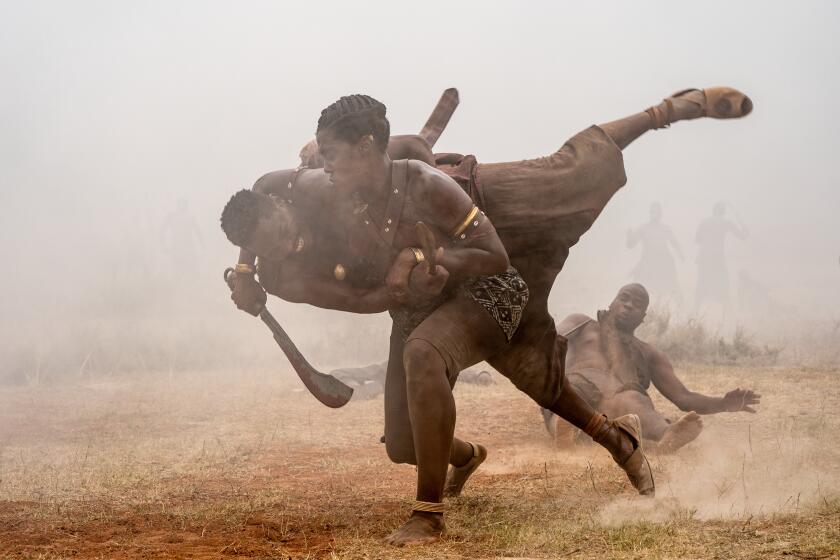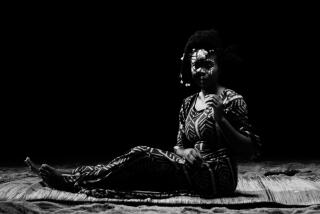Review: Viola Davis adds another jewel to her crown in a rousing ‘Woman King’
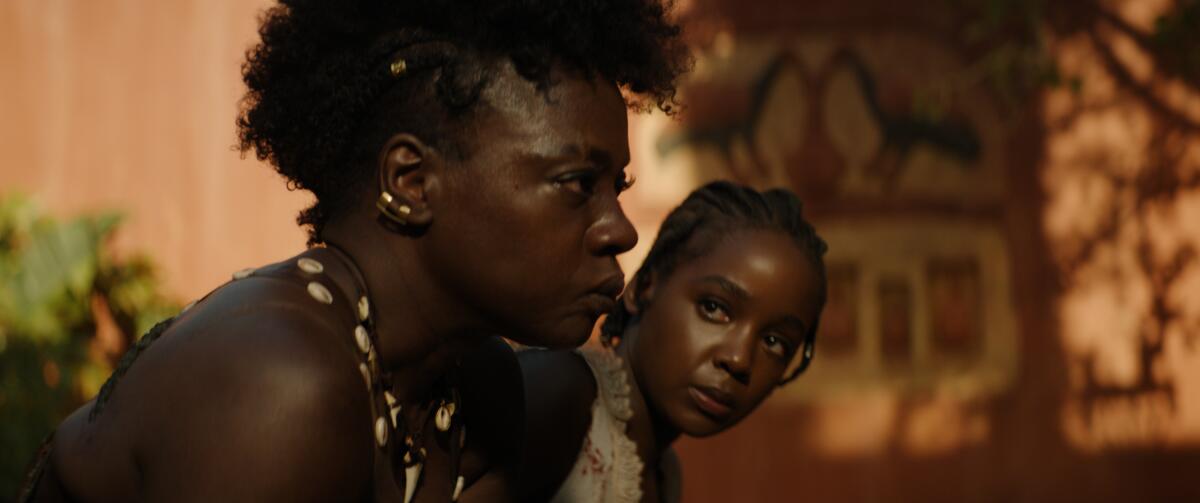
- Share via
With her rousing new action-drama, “The Woman King,” director Gina Prince-Bythewood suggests that, in at least one crucial respect, the West African kingdom of Dahomey was more ahead of its time than that starry imperialist empire called Hollywood. An early 19th century epic awash in militaristic might and colonial oppression, the movie burnishes the truth and the legend of the Agojie, an all-female regiment of warriors who fought for Dahomey with great ferocity, unapologetic bloodlust and selfless abandon. And the most ferocious among them, at least in this swift and satisfying telling, was their top general, Nanisca, played by Viola Davis in the first major action showcase of her career.
That’s a remarkable accomplishment if also a revealing one, and it speaks less to any heretofore uncharted depths of Davis’ talent than to the limits of the film industry’s imagination. While her smarts and gravitas have always made her a natural fit for authority figures (she can do cunning government heavies in her sleep), it has seldom fallen to Davis to play the fearsome warrior. Or, as we see in “The Woman King’s” cut-to-the-quick opening scene, to rise silently from the grasses, sword out, midriff bared, shoulders agleam with sweat and firelight. Her enemies are the gun-wielding, horse-riding male soldiers of the Oyo Empire, who quickly set the stakes in a picture that aspires to the grandly epic scale of “Braveheart,” “Gladiator” and “The Last of the Mohicans.”
For your safety
The Times is committed to reviewing theatrical film releases during the COVID-19 pandemic. Because moviegoing carries risks during this time, we remind readers to follow health and safety guidelines as outlined by the CDC and local health officials.
If “The Woman King” doesn’t always match the visceral intensity of those pictures — Prince-Bythewood, a skillful director of action, keeps the carnage to a PG-13 minimum — it nonetheless rises to the challenge of using an old-fashioned template to deliver a flood tide of exhilarating new images. To watch the Agojie warriors storm into battle, armed with swords and spears and led by Nanisca’s mighty ululating battle cry, is to encounter much more than the standard Hollywood vision of resistance in action. And before long, the Agojie’s ranks are fortified by a fresh batch of recruits, some of whom are refugees from neighboring realms and some of whom, like a stubborn teenager named Nawi (an outstanding Thuso Mbedu), have been disowned and deposited at the palace gates by their fed-up families.
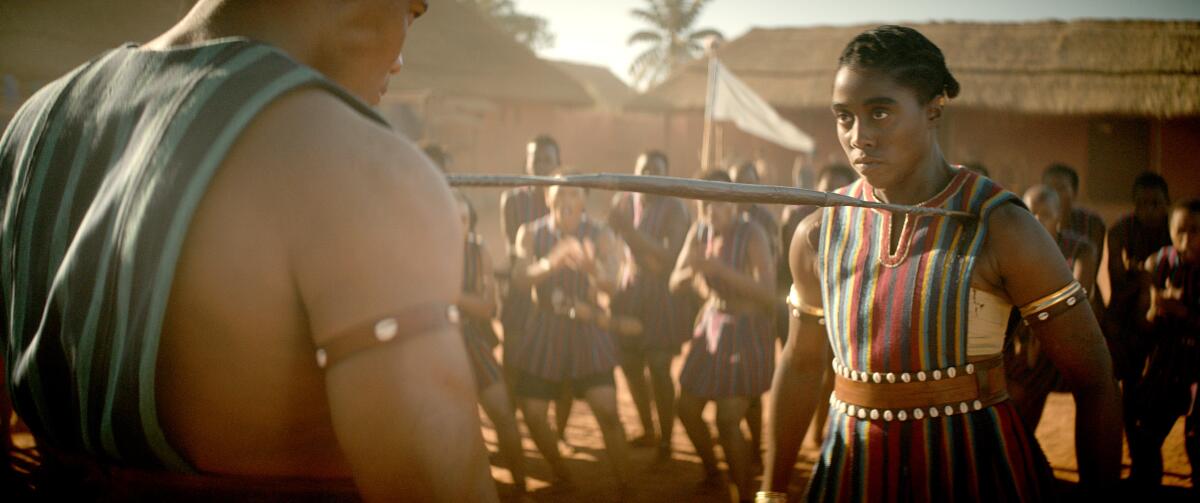
Nawi isn’t a conscript; as Nanisca makes clear, joining the Agojie is a choice. If that feels like a slightly sanitized reading of a military apparatus fed by prisoners of war, it nonetheless suits the story’s dramatic purposes. Becoming a soldier is very much a choice for Nawi, whose impetuousness is both a strength and a weakness, one that Nanisca does her best to temper with a spirit of discipline and self-sacrifice. To join this elite warrior class means taking a vow of lifelong celibacy, dwelling in a women-only section of the palace and swearing allegiance to Ghezo (John Boyega), Dahomey’s male king. Naturally, it also means submitting to the kind of intense fitness regimen — running through thickets of thorns, decapitating dummies stitched from tightly knotted ropes — that great training and competition montages are made of.
Prince-Bythewood steers us through these sequences with terrific sweep and urgency, lingering just long enough for you to take in this world in all its rich, tactile particulars, from the straw roofs and red earthen walls of Akin McKenzie’s production design to the intricately patterned fabrics and elaborate beadwork of Gersha Phillips’ costumes. (Terence Blanchard’s moving score heightens the immersion.) At times you wish the director would linger longer still, the better to let a deeper understanding of Dahomey’s rigid rules, meticulous hierarchies and tangled alliances seep into your bones.
The hard-working, sometimes muddled script, written by Dana Stevens (from a story credited to her and actor Maria Bello, who served as a producer), is too busy laying out the present-tense drama to delve into the history of how the Agojie women came to be. Nor does it unpack the tricky gender nuances of a kingdom where women who became Agojie were essentially considered to have become men, according to some historical accounts. To its credit, the movie does acknowledge some of the story’s uglier historical context, including the fact that Dahomey became a rich nation by profiting off the transatlantic slave trade, selling African prisoners to European invaders. (Jordan Bolger plays a hunky Portuguese Dahomean explorer who catches Nawi’s eye in a perfunctory romantic subplot.)
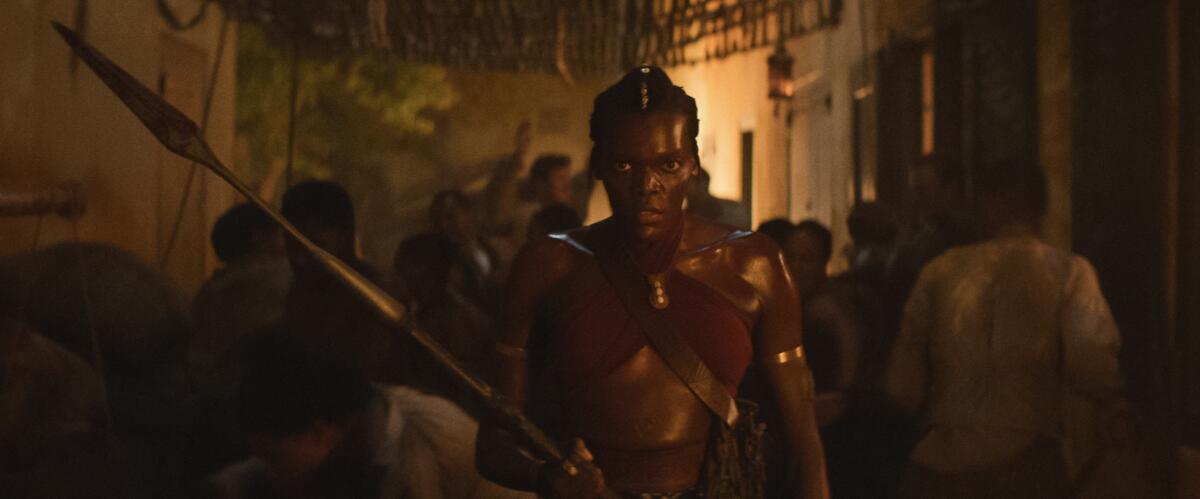
Nanisca abhors her kingdom’s complicity in slavery and is determined to put an end to it — a shrewd if narratively convenient choice that makes her an unambiguously easy hero to root for. It’s not the story’s only trade-off: If the general is easily the most physically imposing character Davis has ever played, that may necessarily preclude her from being the most interesting or psychologically complex. Fortunately, she doesn’t have to be: Commanding as Davis is to watch, she often cedes the spotlight to the other women in her midst. These include Mbedu, the South African-born star of last year’s limited series “The Underground Railroad,” and the Ugandan British actor Sheila Atim, who, as one of Nanisca’s deputies, can rivet the camera without a word. Most of all it includes Lashana Lynch (“No Time to Die”), who’s funny, fierce and finally heartbreaking as Izogie, a warrior who takes Nawi under her wing.
The sense of sisterly solidarity that powers “The Woman King” is the movie’s raison d’être; it’s also part of Prince-Bythewood’s authorial signature. Since she made her feature debut with “Love & Basketball” more than 20 years ago, her commitment to centering women in her storytelling, especially Black women, has never wavered, even as it’s cost her opportunities in an industry that likes to pass off its racism and sexism as commercial imperatives. In recent years the Hollywood tide has clearly begun to turn for Prince-Bythewood, on the evidence of “The Old Guard,” her bracing 2020 action-fantasy for Netflix about a band of immortal warriors. No one lives forever in “The Woman King,” but at its best it’s a reminder that history, even selectively dramatized history, doesn’t have to stay dead.
‘The Woman King,’ directed by Gina Prince-Bythewood and starring Viola Davis, builds a dramatic epic around the real-life women who inspired ‘Black Panther’s Dora Milaje.
‘The Woman King’
Rated: PG-13, for sequences of strong violence, some disturbing material, thematic content, brief language and partial nudity
Running time: 2 hours, 15 minutes
Playing: Starts Sept. 16 in general release
More to Read
Only good movies
Get the Indie Focus newsletter, Mark Olsen's weekly guide to the world of cinema.
You may occasionally receive promotional content from the Los Angeles Times.
